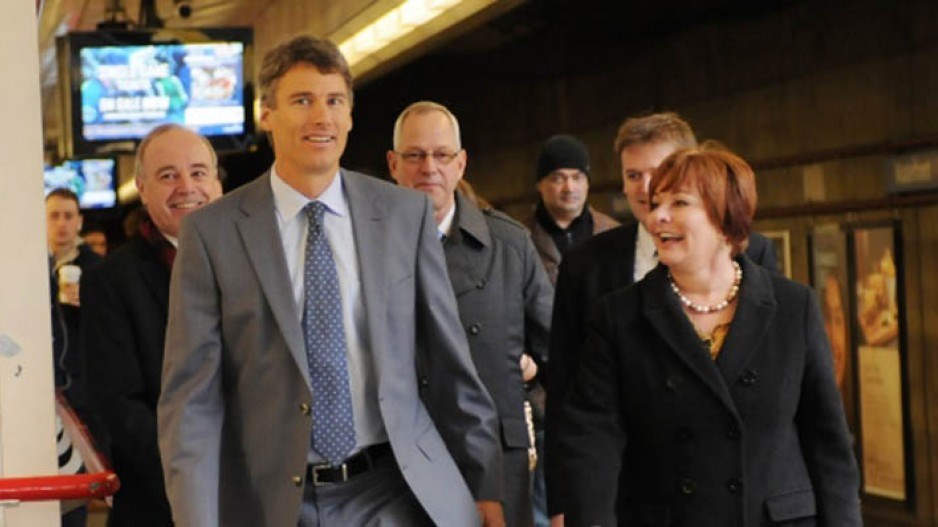Seven mayors, including Gregor Robertson of Vancouver and Linda Hepner of Surrey, kicked off a campaign Monday (February 2) to urge Metro Vancouverites to vote Yes in a spring plebiscite on transportation that asks voters whether they approve of a 0.5% sales tax hike to help pay for a $7.5 billion plan to ease congestion in the region.
But the mayors, who gathered at the Waterfront transit station downtown, found themselves answering questions on why voters should trust TransLink to use the tax hike money for the mayors’ 10-year plan, which includes a subway along the Broadway corridor and a light rail transit system in Surrey.
The No TransLink Tax side has characterized TransLink as a “wasteful organization,” pointing to millions of dollars in cost overruns to Compass Card and fare gate systems and big payouts to executives.
“We’ll obviously be watching very closely as TransLink manages all of its finances going forward — we’ll keep a close eye on that,” Robertson told reporters.
The mayors have no governing power to ensure funds are matched to projects, although Robertson and Hepner, who are chairperson and vice-chairperson of the mayors’ council on regional transportation, have seats on TransLink’s board of directors.
“There is clarity from the B.C. government that there will be accountability and transparency,” Robertson added. “We’re looking at ensuring that that is built into the funding so that all taxpayers have assurances that this money is going directly into transit and transportation investments for the region for the future.”
Hepner said an independent audit will be conducted every year to ensure the funding is going to the projects, which are planned to be built over 10 years and includes an immediate 25% increase in bus service across Metro Vancouver, which reaches from West Vancouver to Langley.
“We think this is the most efficient and sustainable way to move this region forward,” said Hepner, who estimated that congestion is costing the region $1 billion per year in losses to the economy.
A 0.5% increase to the provincial sales tax would raise $250 million a year to help pay for the $7.5-billion plan, which also includes increased HandyDart and Seabus service, upgrades to roads and cycling infrastructure and a new Patullo Bridge.
The plan relies heavily on funding from the provincial and federal governments. Robertson and Hepner will be in Toronto later this week for a Federation of Canadian Municipalities’ meeting, dubbed the Big Cities Summit, but don’t have meetings scheduled with federal ministers while in Ontario.
“We’ll obviously be back in Ottawa in the near future to talk to ministers and make sure that they understand our needs as they go into the federal budget,” Robertson said. “We’re talking to all the parties as they put their election platforms together.”
The mayors’ Yes campaign kick-off came the week after West Vancouver Mayor Michael Smith garnered widespread media attention for an opinion piece he wrote for the No TransLink Tax campaign’s website.
Though he argued transit and transportation upgrades are needed for the region, Smith said transit has been treated far too long like a political football, being “kicked back and forth between the province and the region.”
“The proposed plebiscite offers no relief from this,” he wrote. “I fully support an efficient and effective transit system but to make it a reality we need local control to plan, operate and fund the system and be accountable for results. Metro Vancouver now provides water, sewer, garbage and other essential services. Transit can certainly join the list.”
Coquitlam Mayor Richard Stewart, Port Coquitlam Mayor Greg Moore, Langley Township Mayor Jack Froese and Langley City Mayor Ted Schaffer all spoke at Monday’s news conference in support of a Yes vote.
The provincial government announced over the weekend that money collected under a 0.5% sales tax would be harmonized with the existing provincial sales tax to avoid confusion for businesses collecting the tax.
Metro Vancouver residents can expect to begin receiving mail-in ballots in March for the plebiscite. Results are expected in June, with a positive result needing more than 50% of the vote.




